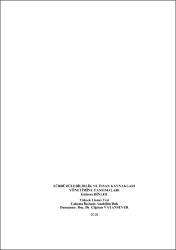| dc.contributor.author | Dinler, Gülesra | |
| dc.date.accessioned | 2018-06-07T13:58:58Z | |
| dc.date.available | 2018-06-07T13:58:58Z | |
| dc.date.issued | 2018 | |
| dc.identifier.uri | https://hdl.handle.net/20.500.11776/2640 | |
| dc.description.abstract | Günümüze dek ekonomik kalkınma ve çevrenin korunması birbiriyle çelişen kavramlar olarak değerlendirilmiş, bu süreçte tercih hep kalkınmadan yana kullanılmıştır. Ancak son yıllarda bu inanış artık çürütülürken; ekonomik kalkınma konusunda hem çevre hem de toplumun çıkarlarını gözeterek atılan adımlar günden güne artmaktadır. Sürdürülebilir kalkınma anlayışı her iki olgunun da birbirini destekleyen ve birbirinden beslenen taraflar olduğunu, dolayısıyla arada bir çıkar çatışması yaratılmadan da sorunların çözülebileceğini, hatta ilerlemenin ancak bu yolla sağlanabileceğini öne sürmektedir. Sürdürülebilir bir dünyaya uzanan bu yolda bugün, işletmeler finansal etkilerinin üzerinde sorumlulukları olduğu bilinci ile sürdürülebilirlik raporlarında toplum, çevre ve ekonomi konusunda da toplam etkilerini ölçmektedirler. Çalışmamız kapsamında Türkiye’de çalışma yaşamının yönünü belirleyen büyük şirketlerin sürdürülebilirlik bağlamında insan kaynakları uygulamaları incelenmiştir. Böylelikle insan kaynaklarının sürdürülebilirliğine ilişkin neler yapıldığı ve insan kaynakları yönetimi adına yürütülen sürdürülebilirlik uygulamalarının neler olduğuna yanıt bulmak hedeflenmiştir. Bu kapsamda, Türkiye Fortune 50 listesinde yer alan işletmelerden 2016 yılı raporunu zamanında yayınlamış ve düzenli olarak raporlama yapan 11 şirket seçilmiştir. Analiz için, şirketlerin sürdürülebilirlik raporlarında insan kaynaklarıyla ilgili madde ve ifadeler derlenmiş ve Ehnert (2009) tarafından belirlenen “İKY ile ilişkili sürdürülebilirlik kategorileri” bir kriter listesine dönüştürülerek içerik analizi gerçekleştirilmiştir. Çalışmanın bulguları, Ehnert modeline göre Türkiye’de en fazla içeriğin “Yeteneği cezbetme ve “çalışanların tercih ettiği bir şirket” olarak tanınma” ile “Çalışanlar üzerindeki negatif etkilerin azaltılması” kriterleri altında toplandığını göstermektedir. Türkiye’de insan kaynakları yönetiminde sürdürülebilirliğe ilişkin içeriğin Ehnert’in modelinden farklılaşan kısımları tümevarımsal bir yaklaşımla ayrıca bulgularda sunulmuştur. | en_US |
| dc.description.abstract | For quite long time, economical development and environmental protection have been considered mutually exclusive and contradicting topics and, economic development has been preferred over the other during all this time. However, while this belief has now being refuted; the steps taken towards economical development are getting forward with the consideration of both the benefits of environment and society. Sustainable development approach states that the two objects actually support and foster each other; as a matter of fact, the development can only be provided via this way; therefore, the issues can be solved without creating any conflict of interest between them. Towards a sustainable world today, the corporations have realized that they have responsibilities not only for their financial impact but also for society and environment; hence measure and report their overall impact through sustainability reports. Within the scope of our research, human resources practices of the corporations which have the biggest impact on the standards of work life in Turkey have been examined in sustainability context. It is aimed to find out what is being done for sustainability of human resources and which sustainability practices are conducted on behalf of human resources management. 11 companies which are issuing sustainability reports regularly are selected out of Fortune 50 Turkey for further study. Human resources related materials and statements are collected from sustainability reports and Ehnert (2009)’s HR related sustanability categories are used as evaluation criteria; subsequently, content analysis has been conducted. The findings of the study indicates that the most common practices in Turkey are listed under “Attracting talent and being recognised as an ‘employer of choice’” and “Reduce impact on HR”. In the findings, the differing parts from Ehnert’s model are also presented with an inductive approach. | en_US |
| dc.language.iso | tur | en_US |
| dc.publisher | Namık Kemal Üniversitesi | en_US |
| dc.rights | info:eu-repo/semantics/embargoedAccess | en_US |
| dc.subject | İçerik analizi | en_US |
| dc.subject | insan kaynakları yönetimi | en_US |
| dc.subject | Sürdürülebilirlik | en_US |
| dc.subject | content analysis | en_US |
| dc.subject | human resources | en_US |
| dc.subject | sustainability | en_US |
| dc.title | Sürdürülebilirlik ve insan kaynakları yönetimine yansımaları | en_US |
| dc.title.alternative | For quite long time, economical development and environmental protection have been considered mutually exclusive and contradicting topics and, economic development has been preferred over the other during all this time. However, while this belief has now being refuted; the steps taken towards economical development are getting forward with the consideration of both the benefits of environment and society. Sustainable development approach states that the two objects actually support and foster each other; as a matter of fact, the development can only be provided via this way; therefore, the issues can be solved without creating any conflict of interest between them. Towards a sustainable world today, the corporations have realized that they have responsibilities not only for their financial impact but also for society and environment; hence measure and report their overall impact through sustainability reports. Within the scope of our research, human resources practices of the corporations which have the biggest impact on the standards of work life in Turkey have been examined in sustainability context. It is aimed to find out what is being done for sustainability of human resources and which sustainability practices are conducted on behalf of human resources management. 11 companies which are issuing sustainability reports regularly are selected out of Fortune 50 Turkey for further study. Human resources related materials and statements are collected from sustainability reports and Ehnert (2009)’s HR related sustanability categories are used as evaluation criteria; subsequently, content analysis has been conducted. The findings of the study indicates that the most common practices in Turkey are listed under “Attracting talent and being recognised as an ‘employer of choice’” and “Reduce impact on HR”. In the findings, the differing parts from Ehnert’s model are also presented with an inductive approach. KEY WORDS: CONTENT ANALYSIS, HUMAN RESOURCES, SUSTAINABILITY | en_US |
| dc.type | masterThesis | en_US |
| dc.department | Enstitüler, Sosyal Bilimler Enstitüsü, Çalışma İktisadı Ana Bilim Dalı | en_US |
| dc.authorid | masterThesis | en_US |
| dc.relation.publicationcategory | Tez | en_US |



















